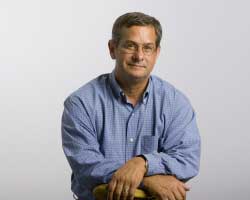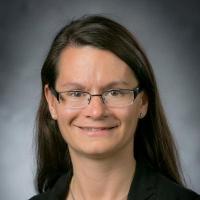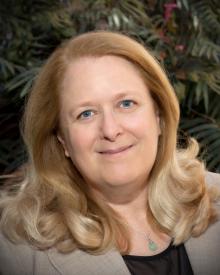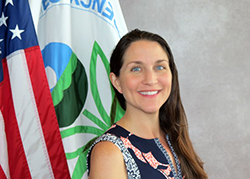Superfund Research Program Progress in Research Webinar Part 1: Duke University and University of Arizona
Sponsored by: NIEHS Superfund Research Program
Archived: Thursday, August 23, 2018
This Superfund Research Program (SRP) Progress in Research webinar series highlights promising research from SRP Centers awarded grants in 2017. In this session, awardees from Duke University and University of Arizona will describe their research projects, accomplishments, and next steps.
The Duke University SRP Center focuses on early, low-dose exposures to toxicants and developmental impacts, which are usually evident only later in life. They conduct research to characterize these outcomes following exposure to polycyclic aromatic hydrocarbons, organophosphate pesticides and flame retardants, halogenated phenolic compounds, and some metals. They are also investigating mechanisms and approaches to remove these chemicals from the environment.
The University of Arizona SRP Center is addressing the risk and remediation of metal mining wastes in arid and semi-arid environments, focusing on Arizona mines as examples that can apply to other hard-rock mines around the world. Center scientists focus on finding innovative and cost-effective methods for remediating airborne and waterborne mine waste and on evaluating the effect of dusts that contain arsenic on lung development and health.
Accessibility, Recording, and Content Disclaimer
Rehabilitation Act Notice for Reasonable Accommodation
It is EPA's policy to make reasonable accommodation to persons with disabilities wishing to participate in the agency's programs and activities, pursuant to the Rehabilitation Act of 1973, 29 U.S.C. 791. Any request for accommodation should be made to Sara Amolegbe at 919-794-4700 or samolegbe@michaeldbaker.com, preferably one week or more in advance of the webinar, so that EPA will have sufficient time to process the request. EPA would welcome specific recommendations from requestors specifying the nature or type of accommodation needed. Please note that CLU-IN provides both alternate phone call-in options and closed captioning for all webinars, and requests for these specific accommodations are not necessary.
Webinar Recording
By participating in this CLU-IN webinar, you automatically agree to authorize recording of audio and visual content presented during this live event and consent to subsequent use of this recording in the public domain by the U.S. Environmental Protection Agency. This recording may include questions, comments and poll responses provided by you during the live event in addition to your name, voice, image or likeness. This recording will be made available after the conclusion of the live event as part of the CLU-IN webinar archives, and will remain available indefinitely. If you do not wish to consent to the recording, please do not join the live event, and contact Jean Balent at 202-566-0832 or balent.jean@epa.gov to discuss your concerns.
Content Disclaimer
This webinar is intended solely to provide information to the public. The views and opinions expressed as part of this webinar do not necessarily state or reflect those of the U.S. Environmental Protection Agency. It is not intended, nor can it be relied upon, to create any rights enforceable by any party in litigation with the United States, or to endorse the use of products or services provided by specific vendors. With respect to this webinar, neither the United States Government nor any of their employees, makes any warranty, express or implied, including the warranties of merchantability and fitness for a particular purpose, or assumes any legal liability or responsibility for the accuracy, completeness, or usefulness of any information, apparatus, product, or process disclosed, or represents that its use would not infringe privately owned rights.
Presenters:
 Richard Di Giulio, Ph.D., Duke University (richd@duke.edu or 919-613-8024)
Richard Di Giulio, Ph.D., Duke University (richd@duke.edu or 919-613-8024)
Richard Di Giulio, Ph.D., is the Sally Kleberg Professor of Environmental Toxicology in the Nicholas School of the Environment at Duke University. He also directs the Duke University SRP Center and the Duke Integrated Toxicology and Environmental Health Program. His research is focused on molecular and organismal responses of aquatic animals to environmental stressors, particularly contaminants. His laboratory is concerned with both basic studies of mechanisms of contaminant metabolism, adaptation and toxicity, and with the development of sensitive, mechanistically-based indices of exposure and toxicity that can be used in biomonitoring of free-living organisms. Additionally, through collaborations, he seeks innovative approaches for elucidating linkages between human and ecological health. He received his Ph.D. at Virginia Polytechnic Institute and State University, an M.S. at Louisiana State University, and a B.A. at the University of Texas at Austin.
 Joel Meyer, Ph.D., Duke University (joel.meyer@duke.edu or 919-613-8109)
Joel Meyer, Ph.D., Duke University (joel.meyer@duke.edu or 919-613-8109)
Joel Meyer, Ph.D., is the Truman and Nellie Semans/Alex Brown & Sons Associate Professor of Molecular Environmental Toxicology in the Nicholas School of the Environment at Duke University. He studies the effects of toxic agents and stressors on human and wildlife health. He is particularly interested in understanding the mechanisms by which environmental agents cause DNA damage, the molecular processes that organisms employ to protect prevent and repair DNA damage, and genetic differences that may lead to increased or decreased sensitivity to DNA damage. Mitochondrial DNA damage and repair, as well as mitochondrial function in general, are a focus. He studies these effects in the nematode Caenorhabditis elegans, in cell culture, and collaboratively in other laboratory model organisms as well as in human populations in the USA and globally. Meyer obtained a Ph.D. in environmental toxicology at Duke University and received his undergraduate degree from Juniata College with a dual degree in environmental studies and peace and conflict studies.
 Claudia Gunsch, Ph.D., Civil and Environmental Engineering, Duke University (ckgunsch@duke.edu or 919-660-5208)
Claudia Gunsch, Ph.D., Civil and Environmental Engineering, Duke University (ckgunsch@duke.edu or 919-660-5208)
Claudia Gunsch, Ph.D., is the Theodore S. Kennedy Associate Professor of Civil and Environmental Engineering and Associate Vice Provost for Faculty Advancement at Duke University. She also holds secondary appointments in the Nicholas School of the Environment and the Department of Biomedical Engineering. She joined the Duke Faculty in 2004 after obtaining her PhD from the University of Texas at Austin, her MS from Clemson University and her BS from Purdue University. Currently, she serves as an Associate Director for the Duke Microbiome Center and as the Director of IBIEM (Integrative Bioinformatics for Investigating and Engineering Microbiomes), a joint graduate training program between Duke and North Carolina A&T State University. Her research bridges environmental engineering and molecular biotechnology. Current research foci include investigating the impacts of emerging contaminants on environmental microbiomes, developing technologies for improving bioremediation efficacy, studying microbial evolution following exposure to anthropogenic contaminants and developing innovative water treatment technologies. Her work has been funded by the National Science Foundation, US Environmental Protection Agency, National Institute for Environmental Health and Safety as well as state funding agencies and private industry. She has been recognized for her research, teaching and service activities with several awards including the 2009 National Science Foundation Faculty Early Career Development Award, 2013 Langford Lectureship Award, 2016 Capers and Marion McDonald Award for Excellence in Mentoring and Advising and the 2016 American Society of Civil Engineers (ASCE) Walter L. Huber Civil Engineering Research Prize. Dr. Gunsch was named a Bass Fellow in 2016 and Fellow of the National Academy of Engineering for the United States Frontiers of Engineering in 2011 as well as the Indo-American Frontiers of Engineering in 2014. She currently serves as an Associate Editor for Biodegradation and the ASCE Journal of Environmental Engineering. She is also a member of the Editorial Board for npj Clean Water and Industrial Biotechnology. She has held several leadership roles within the Environmental & Water Resources Institute (EWRI) of ASCE as well as the Association of Environmental Engineering and Science Professors. Most recently, she was elected as the Chair for the EWRI Environmental Council.
 Raina Maier, Ph.D., University of Arizona (rmaier@ag.arizona.edu or 520-621-7231)
Raina Maier, Ph.D., University of Arizona (rmaier@ag.arizona.edu or 520-621-7231)
Raina Maier, Ph.D., is an environmental microbiologist in the Department of Environmental Science at the University of Arizona. Her research program focuses on understanding how we can exploit microbes and their activities and products to benefit human health and the environment. She is known for her work on the relationships between microbial diversity and ecosystem function in arid and semi-arid environments with a focus on mine tailings and desert soils. Dr. Maier serves as the Director of the University of Arizona NIEHS Superfund Research Center which seeks to understand the health impacts and advance innovative solutions for remediation of mine waste sites. Related to mining, her group's innovative work on establishing vegetative caps on mine waste is changing the way we think about and evaluate the revegetation process.
Moderators:
 Heather F. Henry, Ph.D., Program Administrator, NIEHS Superfund Research Program (heather.henry@nih.gov)
Heather F. Henry, Ph.D., Program Administrator, NIEHS Superfund Research Program (heather.henry@nih.gov)
Heather Henry, Ph.D., is a health science administrator for the NIEHS where she oversees Superfund Research Program (SRP) grants that spans human health toxicology, risk assessment, detection technologies and remediation approaches. She provides guidance to potential applicants for SRP’s Multiproject Center Grants (P42s), Individual Research Grants (R01s), Small
Business / Technology Transfer Grants (R41-44; SBIR/STTR), and Conference Grants (R13). Heather studied plant-based environmental remediation
(phytoremediation) and ecological restoration as part of her doctoral work at the University of Cincinnati and as a Fulbright Postdoctoral Fellow at the University of Melbourne and University of Adelaide in Australia. She has been with NIEHS since 2006.
 Jean Balent, U.S. EPA Technology Innovation and Field Services Division (balent.jean@epa.gov or 202-566-0832)
Jean Balent, U.S. EPA Technology Innovation and Field Services Division (balent.jean@epa.gov or 202-566-0832)
Ms Balent is on the staff of the EPA's Technology Innovation and Field Services Division where she has worked to collect and disseminate hazardous waste remediation and characterization information since 2003. Ms Balent manages the Clean Up Information Network website and actively supports online communication and collaboration resources available to EPA. She formerly worked with the US Army Corps of Engineers Environmental Engineering Division in the Buffalo District. Ms Balent was also a member of the SUNY-Buffalo Groundwater Research Group where she constructed and tested large scale models of groundwater flow. Ms Balent has also conducted research relating to the Great Lakes, environmental remediation, and brownfields re-development. She holds a Bachelor's degree in environmental engineering from SUNY-Buffalo and a Master's degree in Information Technology from AIU.
Webinar Slides and References:
Webinar Slides and References:
-
 Slide Presentation for Duke University SRP Center (6.46MB/PDF)
Slide Presentation for Duke University SRP Center (6.46MB/PDF)
-
 Slide Presentation for University of Arizona SRP Center (6.51MB/PDF)
Slide Presentation for University of Arizona SRP Center (6.51MB/PDF)
Additional Resources:
If you have a suggested topic or idea for a future CLU-IN internet seminar, please contact:
Technology Integration and Information Branch
PH: 202-566-0832 | Email: balent.jean@epa.gov
Technology Integration and Information Branch
PH: 202-566-0875 | Email: adam.michael@epa.gov





